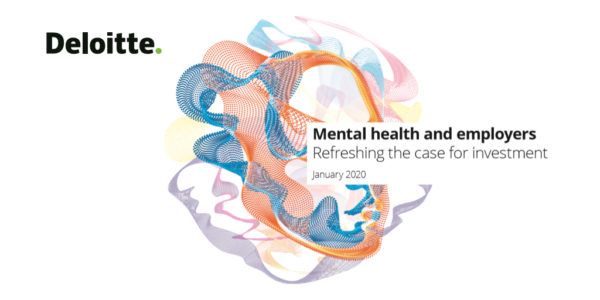Mental health in the workplace: a new report from Deloitte and the charity Mind makes the case that investing in mental health is good business for UK employers.
Mental health and employers: refreshing the case for investment
There is growing concern and reporting surrounding the mental health of workers. This new report from Deloitte and Mind puts forward an interesting case for employers investing in mental health, with an average return of £5 for every £1 spent.
How has mental health awareness improved in the workplace?
Building on their report in 2017, some positive changes are noted such as:
- Greater support being provided for employees, particularly in large organisations
- More social awareness of mental health issues
- A reduction in the level of stigma at work associated with mental health issues.
Which mental health workplace issues are on the rise?
- The burden of poor mental health at work affects young people disproportionately, and there has been an increase in the prevalence of mental health problems among this age group
- A rise in ‘leaveism’, where employees are unable to disconnect from work due to an increased use of technology, contributing to burnout.
- An increase in people working under short-term contracts, in freelance work or without sufficient employer support, creating uncertainty about their financial future and with little concern for their mental health and wellbeing needs.
The report takes an in-depth look at the real cost of mental health at work. What has changed? Why should employers invest in mental health? What more can employers do?
Presenteeism, leavism and debt are major mental health issues in the workplace
The findings show a £45 billion cost to employers. This is put down to an increase in presenteeism (working when unwell and being less productive) and leaveism (improper use of leave). Rates of leaveism and presenteeism are rising. They are characteristics of a technology‑enabled, always‑on workplace culture, and are closely linked to employee burnout. In addition, rising levels of debt have led to an increase in stress caused by personal finance worries.
Young professionals are most at risk of developing mental health issues at work without employer support
Young professionals have emerged as the most vulnerable demographic in the workplace. They are twice as likely to suffer from depression as the average worker, and more susceptible to leaveism and financial concerns.
Our research finds that young people need greater support from employers than they are currently receiving.
Our CEO, Laura-Jane Rawlings, says:
“In our Manifesto for Youth Employment, we provided some key recommendations for government to help address the mental health crisis. The recommended call for bold action to accelerate the current plans which will require increased investment. We would argue that there is little choice.
If everyone doesn’t work together to achieve more immediate and bolder action, the cost and implication of this continued failure to support young people will be much greater in the long run.”
See more on Laura-Jane Rawlings’ views on the need to invest in the mental health of young people.







